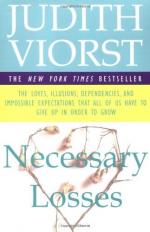
|
| Name: _________________________ | Period: ___________________ |
This test consists of 5 multiple choice questions, 5 short answer questions, and 10 short essay questions.
Multiple Choice Questions
1. According to Viorst, in middle age we inspire far less ________ than we do ___________.
(a) Lust; respect.
(b) Respect; pity.
(c) Admiration; annoyance.
(d) Hatred; love.
2. According to Chapter 20, Viorst is living on what to beat her middle-aged spread?
(a) NutriSystem.
(b) Grapefruit.
(c) Lean Cuisine.
(d) Weight Watchers.
3. What sort of thing did Selena's children no longer want her to do when they separated?
(a) Make a Travel Book.
(b) Set out their clothes.
(c) Hire a babysitter.
(d) Leave a note on their dresser.
4. What is the name of the son in Death of a Salesman that Viorst uses as an example of the restricting roles some parents foist on their children?
(a) Jonathan.
(b) William.
(c) Jeff.
(d) Biff.
5. Simone de Beauvoir once said, "Old age is life's ___________."
(a) Swan song.
(b) Final act.
(c) Parody.
(d) Cruel joke.
Short Answer Questions
1. What type of relationship reinforces our self-knowledge, widens our worldview, and supports our self-esteem?
2. How many stages are there in the journey towards death according to Kubler-Ross?
3. The earliest text on the subject of aging came from where?
4. What is the name of Elisabeth Kubler-Ross's highly influential book?
5. What is the first phase of mourning discussed in Chapter 16?
Short Essay Questions
1. According to Chapter 17, what redefines us throughout our lives?
2. Viorst describes a sort of "opposites attract" type marriage relationship where each party meets a neurotic need of the other party. What did she call this type of arrangement?
3. What are a few of the difficulties of a marriage relationship mentioned in Chapter 13?
4. According to the book, why are friends so important?
5. What are some of the different types of loss and mourning discussed in Chapter 16? Do we experience them all in the same way?
6. According to the book, when does the way we will handle aging begin?
7. What is the fundamental tension in all man-woman marriages?
8. What is described as the ultimate separation in Chapter 18?
9. What can happen as a result of a mother's fear that her child's psyche is fragile? How can this affect the child?
10. According to Freud, is it unusual to have sexual feelings toward friends? How does this impact our friendships with the opposite sex?
|
This section contains 771 words (approx. 3 pages at 300 words per page) |

|




